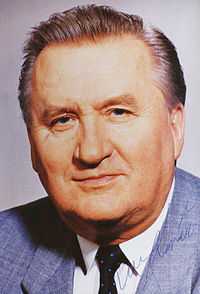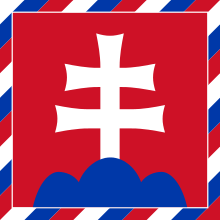Michal Kováč
| Michal Kováč | |
|---|---|
 | |
| 1st President of Slovakia | |
| In office March 2, 1993 – March 2, 1998 | |
| Preceded by | office created |
| Succeeded by | Rudolf Schuster |
| 7th Chairman of the Federal Assembly of Czechoslovakia | |
| In office June 25, 1992 – December 31, 1992 | |
| Preceded by | Alexander Dubček |
| Succeeded by | office abolished |
| Finance Minister of Slovak Federal Republic | |
| In office December 12, 1989 – May 17, 1991 | |
| Preceded by | -??- |
| Succeeded by | Anton Vavro (acting) |
| Personal details | |
| Born | August 5, 1930 Ľubiša, Czechoslovakia |
| Spouse(s) | Emília Kováčová |
Michal Kováč (born 5 August 1930) is a former and the first President of Slovakia.[1]
He graduated from the present-day University of Economics in Bratislava and was a bank employee of the Státní banka československá and of other banks. As such, he spent some years in London and in Cuba in the 1960s. During the Normalization he was subject to some persecution.
During and after the Velvet Revolution, from December 12, 1989 to May 17, 1991 (when he resigned) he was the Finance Minister of the Slovak (Socialist) Republic.
In early 1991, he was one of the founders and the vice-chairman of the Movement for a Democratic Slovakia. As such, he was elected as a deputy to the Federal Assembly of Czechoslovakia in 1990. After the 1992 election he served as the Chairman of the Federal Assembly from June 25, to December 31, 1992. He played an important role in the process of the preparation of the Dissolution of Czechoslovakia.
He was elected president by the National Council of Slovakia in February 1993 (because he was a candidate of the biggest parliamentary party—the Movement for a Democratic Slovakia) and inaugurated on March 2, 1993. He soon became a strong opponent of Prime Minister Vladimír Mečiar and by giving a critical presidential address to parliament in March 1994, Kováč significantly contributed to the deposition of the then Mečiar government and the creation of the Moravčík government (which only lasted until the next parliamentary election in the autumn of 1994).
In 1995, the Mečiar-Kováč conflict intensified and the Movement for a Democratic Slovakia cancelled Kováč's (formal) membership in the party. In August 1995, Kováč's son—who had been accused of financial crimes by German authorities (the accusation was later canceled) was apparently kidnapped and taken to Austria. The president, opposition parties and Austrian court accused the Slovak intelligence service (SIS) and the government of having organized this kidnapping. The investigation of new secret intelligence service director Mitro and Slovak police after collapse of Meciar's regime in the end of 1999 confirmed the participation of SIS on this kidnap but the Slovak justice rejected the trial with its suspected actors because of amnesty (also called self-amnesty) issued by Vladimir Meciar on March 3, 1998.
Kováč's term ended on March 2, 1998. His candidature in the first direct Slovak presidential election, 1999 was unsuccessful. He has not been very visible in Slovak politics since this time and has appeared only at a few symbolic events.
On July 10, 2008 the Slovak media reported that Kováč probably suffers from Parkinson's disease. The former president has not yet confirmed this information but admitted that he has some health problems.
Honours
-
 Slovakia: Grand Master and Grand Cross (or 1st Class) of the Order of the White Double Cross
Slovakia: Grand Master and Grand Cross (or 1st Class) of the Order of the White Double Cross - In 1993, Kovac became the first winner of the Golden Biatec Award, the highest award bestowed by Slovakia’s Informal Economic Forum - Economic Club.[2]
References
- ↑ Bartl, Július (2002-04-01). Slovak history: chronology & lexicon. Bolchazy-Carducci Publishers. pp. 181–. ISBN 978-0-86516-444-4. Retrieved 21 April 2011.
- ↑ http://www.hospodarskyklub.sk/index.cgi?klub2001
| Political offices | ||
|---|---|---|
| Preceded by Vladimír Mečiar as acting President |
President of Slovakia 1993 – 1998 |
Succeeded by Vladimír Mečiar as acting President |
| ||||||||||||
|
